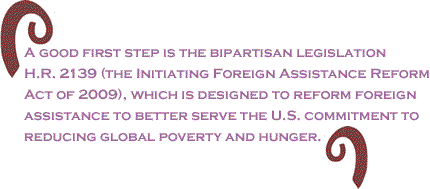
|
||||||||||||||||||||||||

|
|

Custom Search
|
|
 |
|
During President Barack Obama’s recent trip to Ghana, he advised Africans to take responsibility for their destiny and stand up against corruption. In turn, African leaders urged the Obama administration to strengthen and improve U.S. foreign assistance. When I think of my brothers and sisters in Africa, I think about their struggles, past and present. A people who first struggled as slaves on foreign soil now struggle with AIDS, hunger, and poverty. I ask myself, are we rich nations using food as a weapon against our kin? Are they willing to sell their birthright for a bowl of pottage like Esau? Are we coveting their gold, diamonds, oil and other valuable birthrights, or will we find ways to help our brothers and sisters rise up against hunger and poverty? A good first step is the bipartisan legislation H.R. 2139 (the Initiating Foreign Assistance Reform Act of 2009), which is designed to reform foreign assistance to better serve the U.S. commitment to reducing global poverty and hunger. H.R. 2139 currently has 93 cosponsors, including 14 African American members of Congress. Rep. Barbara Lee (D-CA), who chairs the Congressional Black Caucus, is among the growing list of supporters of H.R. 2139. “Setting clear goals and strategy for alleviating poverty, improving global health, and encouraging sustainable development will be essential to strengthening America's foreign assistance capacity. H.R. 2139 would take a significant first step towards attaining these goals,” said Lee. House Foreign Affairs Committee Chair Howard Berman (D-CA) and Rep. Mark Kirk (R-IL) introduced the bill in April. It would require President Obama to develop and implement a comprehensive national strategy for global development, to improve evaluation of development programs, and to increase the transparency of U.S. foreign assistance to developing countries. U.S. global development programs are designed to reduce hunger and poverty in poor countries through projects such as agriculture, nutrition, clean water, education, and health care. For example, Ghanaian farmers are being trained in sustainable farming and business development through a U.S.-funded program run by the Millennium Challenge Corporation. Currently, more than 16,750 farmers have received training; by the end of 2010, the program will have trained more than 60,000 farmers. Despite the fact that foreign aid programs account for only one-half of one percent of our annual budget, the United States is still the world’s largest contributor of development assistance to poor countries.
Currently global development policies and programs are scattered across 12 departments, 25 different agencies, and nearly 60 government offices. U.S. foreign assistance is still largely governed by a law passed in 1961 under President John F. Kennedy. We need 100 cosponsors to move H.R. 2139 forward. Ask your representative to cosponsor the bill, and make a difference for our African brothers and sisters.
BlackCommentator.com Guest Commentator, the Reverend Don Williams works in the Church Relations area of Bread for the World as the Racial/Ethnic Outreach Associate. Bread for the World has been striving to end hunger at home and abroad since 1972. Click here to contact the Rev. Williams. |
|
Any BlackCommentator.com article may be re-printed so long as it is re-printed in its entirety and full credit given to the author and www.BlackCommentator.com. If the re-print is on the Internet we additionally request a link back to the original piece on our Website. Your comments are always welcome. eMail re-print notice
If you send us an eMail message we may publish all or part of it, unless you tell us it is not for publication. You may also request that we withhold your name. Thank you very much for your readership. |
|
| |
|
| July
30, 2009 Issue 335 |
|
|
|
| Executive Editor: Bill Fletcher, Jr. |
|
| Managing Editor: Nancy Littlefield |
|
| Publisher: Peter Gamble |
|
| Est. April 5, 2002 | |
Printer Friendly Version
in resizeable plain
text format or pdf
format. |
|
|
|
 |
|

|
|
 |
|
 |
|
 |
|
| |
|
| |






































